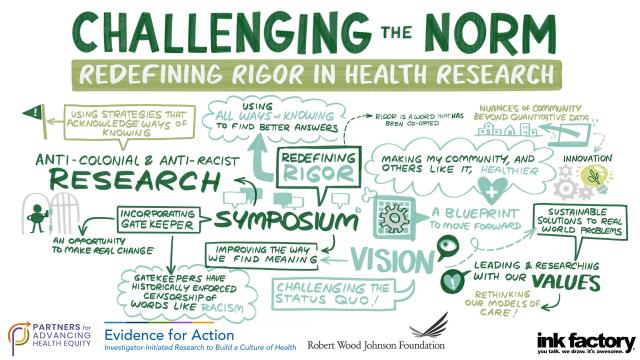Introduction
The fourth Ways of Knowing symposium - “Challenging the Norm: Redefining Rigor in Health Research,” co-organized by Drs. Melody Goodman, Tongtan “Bert” Chantarat, and Adolfo Cuevas, was held on October 16-18, 2024, in Washington, D.C., and brought together a diverse group of anti-racist and anti-colonial health equity researchers, community advocates, decision-makers, and thought leaders. This symposium aimed to identify priorities and levers for dismantling restrictive norms in health research, highlighting pathways to advancing racial and Indigenous health equity. Attendees engaged in deep discussions about reimagining rigor in ways that center community voices and address long-standing inequities in the health sciences and academia.
Through dialogue and shared experiences, participants charted a course toward transformative change, envisioning a health research system that genuinely embraces inclusive practices.
Day 1: Setting the Stage – Defining Anti-Racist and Anti-Colonial Research
The first day’s objective was to establish a foundation for discussions and set a tone of introspection and openness that would characterize the rest of the symposium. We welcomed participants and outlined principles of engagement, emphasizing the creation of a “brave space”—a place for challenging dialogues, authenticity, and shared vulnerability.
Participants explored similarities and distinctions between anti-racist and anti-colonial research, examined critical challenges, and reflected on personal experiences confronting systemic barriers in conducting anti-racist and anti-colonial research.
Day 2: Breaking Barriers – Building Consensus on Guiding Principles
On the second day, we reconvened with a focus on solutions to overcoming structural barriers - such as restrictive data infrastructures and prohibitive costs associated with open-access publishing, which often hinder the dissemination of critical research.
The structured discussions surfaced innovative ideas for overcoming these barriers, like democratizing decision-maker access, incentivizing cross-sector collaboration, and establishing standards for authenticity in community engagement. We also debated the need for positionality statements in research and interrogated the impact of current funding models, which often sideline racial and Indigenous health equity research.
As the day concluded, we synthesized our ideas in a large group discussion, laying the groundwork for guiding principles aimed at redefining rigor in health research to reflect equity and inclusivity.
Day 3: A Vision for Change – Engaging Decision-Makers
The symposium’s final day invited decision-makers into a shared conversation to explore actionable steps for fostering racial and Indigenous equity in health research. Dr. Kirsten Bibbins-Domingo, Editor-in-Chief of JAMA, delivered a keynote on the role of influential institutions in dismantling systemic biases and supporting equity-focused scholarship.
In small groups, researchers and decision-makers discussed strategies for ensuring racial and Indigenous health equity within the health sciences. Key priorities included making research funding more accessible to racial and health equity spaces, developing collaborative research models that reduce competition for limited resources, and challenging the “pay-to-play” structure that limits participation in academic publishing. The day closed with calls to action, leaving participants inspired to continue this crucial work in their respective fields.
Reflections and Next Steps
The symposium underscored the importance of redefining rigor in health research to include diverse perspectives and equitable practices. Despite the real and present challenges we face in doing this work, we left energized to confront the structural changes that are needed within academic institutions, funding models, and publication standards in order to advance critical health equity research. The dialogue and insights generated here contribute to a larger journey, as the Ways of Knowing Symposia series culminates at the Facing Race National Conference on November 20 in St. Louis, MO. This final gathering will provide a platform for reflecting on insights from across the symposia, workshopping actionable steps toward systemic change, and fostering co-creation of structural changes that support inclusive, anti-colonial, and anti-racist health science knowledge. With each step forward, this collaborative movement paves the way for a health research landscape that builds on - as opposed to extracts from - community knowledge, lived experience, and wisdom and contributes to social justice.
